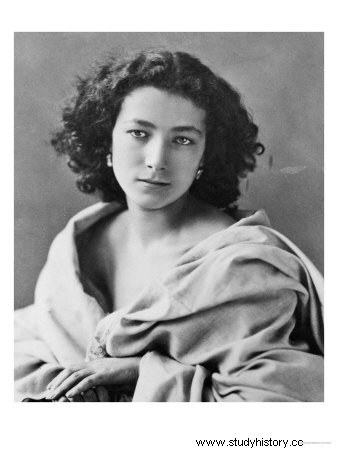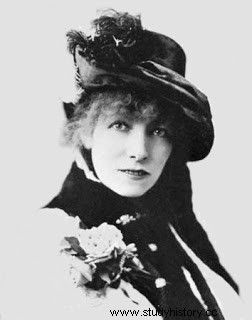Sarah Bernhardt (1844 – 1923) is a very famous French actress and a great tragic actress. She is the first actress to have toured on 5 continents.
Birth of a vocation
 Born October 22, 1844, Sarah Bernhardt is the daughter of Judith-Julie Bernardt, a Dutch courtesan; his father remains unknown. She was born under the name of Rosine Bernardt; it is later that she will change her first name and add an H to her name.
Born October 22, 1844, Sarah Bernhardt is the daughter of Judith-Julie Bernardt, a Dutch courtesan; his father remains unknown. She was born under the name of Rosine Bernardt; it is later that she will change her first name and add an H to her name.
Sarah lived a solitary childhood with a nanny in Quimperlé, where she spoke only Breton, before her mother sent her to the convent of Grand-Champs, in Versailles. Her religious education was completed thanks to the Duc de Morny, her aunt's lover, who allowed her to take courses in sculpture and painting. During a play at the convent, she discovered the theater and her vocation at the same time.
Thanks to the Duc de Morny, she entered the Paris Conservatory of Dramatic Art in 1859, then, in 1862, the Comédie-Française; but she was fired in 1866 for slapping a member. In the meantime, she gave birth to her only son, Maurice, from her affair with a Belgian nobleman. After leaving the Comédie-Française, Sarah signed a contract with the Théâtre de l'Odéon and became known there, notably triumphing in the role of the Queen in Ruy Blas (Victor Hugo). In 1870, when Paris was besieged, she transformed the theater into a military hospital.
The Golden Voice
 After becoming known at the Théâtre de l'Odéon, Sarah Bernhardt returned to play for a few years at the Comédie- French and shines in Phèdre (Root) then Hernani (Victor Hugo). In 1880, she resigned and created her own company, leaving to perform in London, Copenhagen, the United States and Russia. She does not hesitate to interpret male roles. Everywhere, she meets the success and enthusiasm of the public. She is nicknamed "The Golden Voice", "the Divine", "the Scandalous"; Cocteau invented the expression "sacred monster" for her. It inspires pieces, notably l’Aiglon by Edmond Rostand. From 1893, she took over the direction of the Théâtre de la Renaissance and then the Théâtre des Nations, which she renamed the Théâtre Sarah-Bernhardt. She writes a few plays herself.
After becoming known at the Théâtre de l'Odéon, Sarah Bernhardt returned to play for a few years at the Comédie- French and shines in Phèdre (Root) then Hernani (Victor Hugo). In 1880, she resigned and created her own company, leaving to perform in London, Copenhagen, the United States and Russia. She does not hesitate to interpret male roles. Everywhere, she meets the success and enthusiasm of the public. She is nicknamed "The Golden Voice", "the Divine", "the Scandalous"; Cocteau invented the expression "sacred monster" for her. It inspires pieces, notably l’Aiglon by Edmond Rostand. From 1893, she took over the direction of the Théâtre de la Renaissance and then the Théâtre des Nations, which she renamed the Théâtre Sarah-Bernhardt. She writes a few plays herself.
Sarah Bernhardt is credited with numerous liaisons. In 1882, she married in London with a Greek actor, Aristides Damala, but their relationship did not last; however, they will remain married. Eccentric and reputed to lie a lot, Sarah has a strong personality and takes political positions. She supports Zola at the time of the Dreyfus Affair, defends Louise Michel and positions herself against the death penalty.
In 1900, Sarah became a film actress by playing in the film The Duel of Hamlet . She will turn in other films, including two autobiographical ones.
In 1914, Sarah Bernhardt received the Legion of Honor. In 1915, at the age of 70, her right leg was amputated (due to bone tuberculosis) but continued to perform seated and visited soldiers at the front in a sedan chair.
She died in the arms of her son Maurice on March 26, 1923, leaving behind the legend of an actress with the “Voix d’Or”, the “sacred monster” traveling the 5 continents
